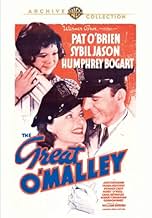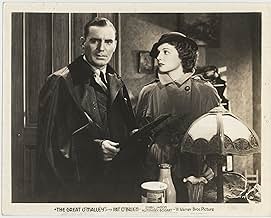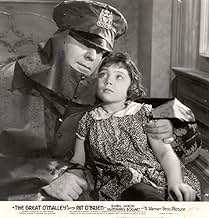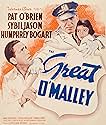Ajouter une intrigue dans votre langueA by-the-book patrolman who cares more about the letter of the law than justice feels guilty when his inflexibility sends a family man to prison.A by-the-book patrolman who cares more about the letter of the law than justice feels guilty when his inflexibility sends a family man to prison.A by-the-book patrolman who cares more about the letter of the law than justice feels guilty when his inflexibility sends a family man to prison.
- Réalisation
- Scénario
- Casting principal
- Mrs. Phillips
- (as Frieda Inescourt)
- Warden
- (non crédité)
- Jake - Bar Proprietor
- (non crédité)
Avis à la une
Bogart was an honest family man who was forced to turn to crime in order to provide for his family after O'Brien arrested him for a minor offense and caused him to lose a job opportunity
Bogart had an excellent chance to show some versatility by turning from his earlier carefree attitude into one of frustration and bitter hatred, and he carried it off rather effectively
All the while, O'Malley holds tight to his belief that he is just doing his job by enforcing all the law the all the time by the book. His captain wants his resignation, and when O'Malley won't give it, he has him assigned to public school crossing guard duty. The captain believes this will break or make the man. Did I mention that Phillips' little daughter goes to the same elementary school where O'Malley is assigned, and they strike up a friendship, neither one knowing who the other is? A romantic and humanizing interest comes in the person of Ann Sheridan as a schoolteacher at the elementary school.
This is a pleasant little early production code era entry, with O'Brien playing the same kind of hard boiled egg he played before the code, but this time donning a policeman's uniform. The only negative in the film, in my opinion, was a common device in films of the mid 30's - a child that is sickly-sticky sweet (Sybil Jason's character) over-sentimentalizing matters and sucking the adult cast into more than a few silly situations. However, at least here the child star is central to the plot. All in all, recommended especially for fans of Pat O'Brien and Ann Sheridan and anybody that is interested in a film in which Sybil Jason is actually billed above Humphrey Bogart - an odd sight indeed some 75 years later.
So what's my beef? Well, let's consider the basic premise of the film: a man (Bogart) is on his way to work in a beat-up car with faulty exhaust and is given a ticket by an overzealous cop (O'Brien). The delay causes him to lose his job and in desperation he commits a burglary which lands him in prison. OK, so the cop didn't have to cite him for such a minor offense and even after he stopped him, could have believed him and let him go. But this is exactly where the logic is flawed and we find out how in the next few minutes. When Bogart tries to pawn some items the pawnbroker asks him why he doesn't go on relief to which Bogart replies that he wouldn't take any handouts. And there you have it. Had the man been on relief he could have fixed his muffler which would have given the cop no reason to stop him and he would have made it to his job on time. But no, in true pioneer spirit, rather than ask for government help (which after all he contributed to with his taxes) and preferring false pride to responsibility to his family he runs foul of the law and ends up in the clink completely powerless. And to me that's stupid.
Now I'll get off my pedestal and stop sermonizing. "The Great O'Malley" many not be masterpiece but it certainly bears watching and a worthy addition to anyone's collection.
** (out of 4)
Boring melodrama from Warner about cop James O'Malley (Pat O'Brien), an overbearing cop who follows the law down to the wire and this includes passing out tickets for the smallest of issues. Soon he costs a poor man (Humphrey Bogart) a job and the man turns to crime and soon finds himself away from his cripple daughter and doing a ten year sentence. O'Malley gains more and more enemies and soon finds himself close to the man's daughter where he might finally learn his lesson. I'm really not sure what the point of this film was for several reasons. O'Malley is an ugly character, a complete jerk and one people are really going to hate so showing this type of cop to people probably wasn't the best of ideas. I'm not even sure why a story like this would interest anyone and the film comes off like the stars and director didn't have much faith in it either. Dietrich is certainly directing by the numbers as nothing here really jumps out at you as having much effort put into it. There's really not any powerful scenes, drama, laughs or anything else. Granted, nothing here is overly bad but just flat. O'Brien gives a decent performance but it's certainly far from his best because there's not much soul or fire to the character. Bogart does get to shine in a role that you normally wouldn't see him play. I thought he did a pretty good job playing the poor guy trying to look out for his family and it's the type of role you'd expect someone like Spencer Tracy to play but Bogie does fine with it. Sybil Jason and Ann Sheridan add nice support as does Donald Crisp. Warner was the studio for blue collar tales but this one here never really works and I'm really not sure what the point of any of it was.
Le saviez-vous
- AnecdotesThe name of an Italian woman in an article read aloud is given as Signora Bacciagalupe. This is an Italian-American slang word meaning "moron."
- GaffesO'Malley frequently refers to a small book, about the size of a an address book, which he says contains the penal code of New York City. An actual such book would be much larger and would be several hundred pages long, as indeed is shown when the judge consults his own copy.
- Citations
Captain Cromwell: [Referring to O'Malley] That guy's brains run with nothing but city ordinances. He spends all his time studying his manual. He picks laws out of the air from wastebaskets, from graveyards! He thinks of things that were enacted when Times Square was a hog ranch.
- ConnexionsFeatured in Breakdowns of 1937 (1937)
- Bandes originalesAmerica
(1831) (uncredited)
aka "My Country 'tis of Thee"
Melody from "God Save the Queen"
Traditional
Words by Samuel Francis Smith
Sung a cappella by the schoolchildren
Meilleurs choix
Détails
- Date de sortie
- Pays d’origine
- Langues
- Aussi connu sous le nom de
- The Great O'Malley
- Lieux de tournage
- Société de production
- Voir plus de crédits d'entreprise sur IMDbPro
- Durée1 heure 11 minutes
- Couleur
- Mixage
- Rapport de forme
- 1.37 : 1
Contribuer à cette page





































